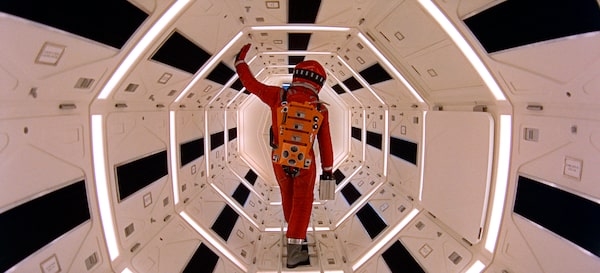
2001: A Space Odyssey by Stanley Kubrick is a science-fiction epic about a trip to Jupiter derailed by the sentient computer named HAL.The Associated Press
Introducing The Globe and Mail’s new series, Summers at the Cinema, in which Globe Arts contributors offer a window into their favourite summer-movie memories from years past. This week, Kate Taylor recalls a childhood pilgrimage to watch 2001: A Space Odyssey
In my childhood, before the rise and subsequent decline of the video store, every other small town had a movie theatre. Sundridge, a little lakeside community on the southern fringe of Northern Ontario where my grandfather had bought a cottage in the 1930s, was not so blessed. But if you pulled back on to Highway 11 as it headed toward North Bay and drove another six miles – for that was how we measured distances in those years before Canada adopted the metric system – you hit South River. And there, the local cinema offered all the delights of Hollywood at the rate of a blockbuster or two per summer season. It wasn’t a palace, as I remember, but a small auditorium on the dusty main street of an old logging town that otherwise provided a lumberyard, a beer store and an outfitters for trips into Algonquin Park.
My family didn’t patronize the movie theatre often. In fact I recall only one occasion, the summer of an expedition to see 2001: A Space Odyssey. Stanley Kubrick’s groundbreaking science-fiction epic about a trip to Jupiter derailed by the sentient computer named HAL had divided critics when it appeared in 1968. Some thought its abstracted meditation on humans, technology and the universe was both beautiful and brilliant. Others found it boring, incomprehensible or pretentious.
Looking back at family chronologies, I realize we must have viewed 2001 several years after it was first released, but still, I can’t have been older than 8 at the time. Whatever the critics may have thought, I don’t suppose I made much of the celebrated movie at all. I have some memory of the increasingly recalcitrant HAL, solidified over the years by his presence in the culture as what we now call a meme: “I’m sorry Dave, I’m afraid I can’t do that.” Otherwise, I only retain vague images of sparkling white spaceships and yawning black voids.
What is most topical about the film is its sinister view of automated intelligence.handout
No, it was not the experience of watching 2001 that fixed the movie in my memory; it was the experience of getting there. In those years when mothers and children spent whole summers at the cottage, my aunt made her daily trips to Lang’s grocery store in a wide station wagon. My uncle, meanwhile, commuted up from the city in what we kids had affectionately dubbed the bubblegum car – so called because its rounded roof reminded us of the pink bubbles we would attempt to blow with our gum. My uncle was a successful Toronto lawyer; the bubblegum car was a late-model Porsche and his precious toy.
A ride in this vehicle was a rare treat but on the day we went to South River to see 2001, it was my turn to sit in the back seat with one of my cousins. It was only a shelf, really, and as we perched there precariously, our knees jammed up against our chests – no seat belts, of course – my uncle turned onto the unpaved back road that added a few miles and many bumps to the trip. As the Porsche roared north at full speed, my cousin and I bounced along enthusiastically, squealing in delight every time we hit our heads on the car’s low roof.
I don’t remember the ride back – we were nine grandchildren in all; it was probably someone else’s turn – and I was well into adulthood before I would see 2001 again. Screening it today, it’s intriguing to see what Kubrick predicted: inflight entertainment, voice recognition, video tablets and artificial intelligence. And what he failed to notice: that social roles in the 1960s were changing rapidly. Apart from a token female Russian scientist in the first act, all the women are hostesses, flight attendants or receptionists. What is most topical is the film’s sinister view of AI, as the infallible HAL suffers a full-blown mental breakdown when confronted with a possible error in his monitoring of the spaceship’s systems.
Despite the lingering Cold War and the nuclear threat, the sixties and seventies were a period of modernist optimism in the West. For me, the grownup world was about my uncle’s prized Porsche and my mother’s smart new pantsuit, about the Beatles and the moon landing. If 2001 impressed me at all, it was as another example of this chic modernity. I was blind to its themes, that technology’s promise was, if not false, at least deeply compromised. The film’s prehistoric prologue foreshadows the link between human inventiveness and destructiveness: It features a band of apes who discover they can use bones as tools, and promptly turn them into weapons with which to beat their neighbours.
For a child, the sports car, the jet plane and the rocket ship were the gleaming machines that would transport us toward a shiny new century. Today, no film as arty as 2001 would ever be proposed as a summer blockbuster but, 18 years after the real 2001 finally did arrive, it is Kubrick’s ambivalent message about human innovation that really foretells the future.
Next week: Brad Wheeler on those summer nights of 1978′s Grease
Live your best. We have a daily Life & Arts newsletter, providing you with our latest stories on health, travel, food and culture. Sign up today.
 Kate Taylor
Kate Taylor